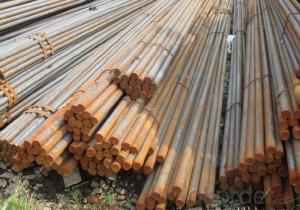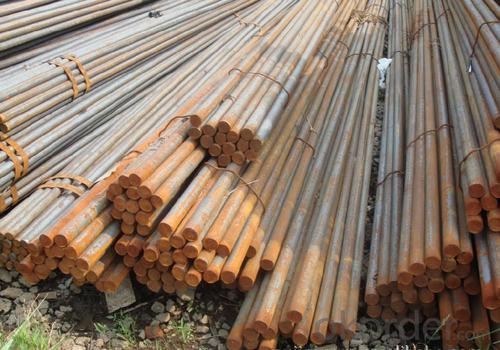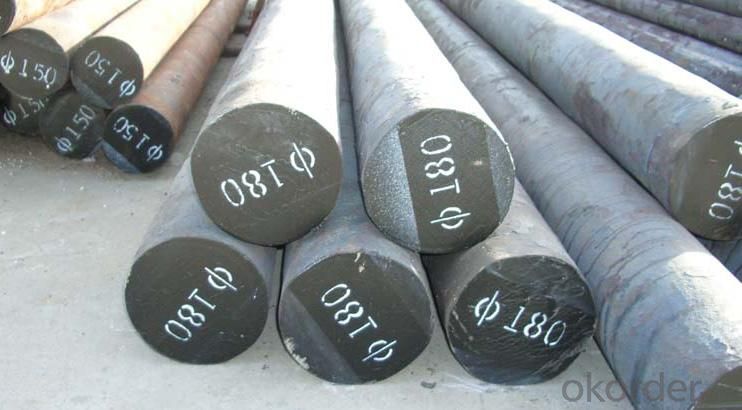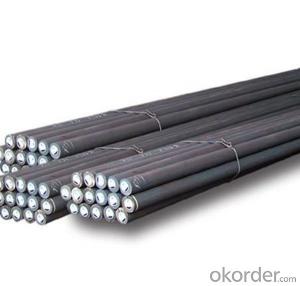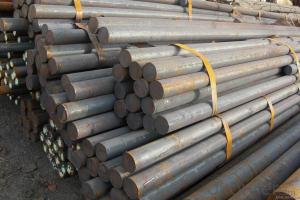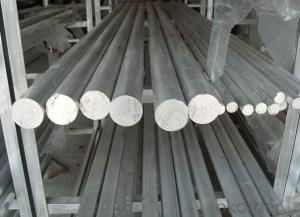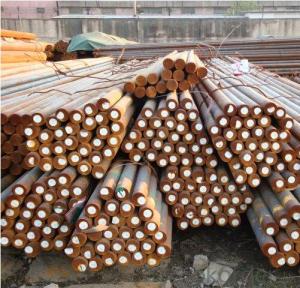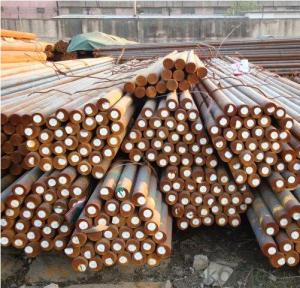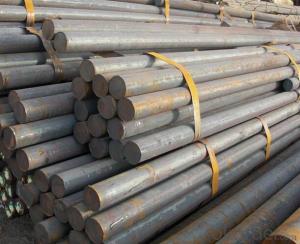Special Steel 7CrSiMnMoV Mould Steel Alloy Steel
- Loading Port:
- China main port
- Payment Terms:
- TT OR LC
- Min Order Qty:
- 25 m.t.
- Supply Capability:
- 10000 m.t./month
OKorder Service Pledge
OKorder Financial Service
You Might Also Like
Specification
Chemical Composition(%)
| C | Si | Mn | Cr | Mo | V | S | P |
| 0.65-0.75 | 0.85-1.15 | 0.65-1.05 | 0.90-1.20 | 0.20-0.50 | 0.15-0.30 | ≤0.30 | ≤0.30 |
Available Size
| Forged flat steel | 20-280mm×400mm×L |
Heat Treatment
| Item | Temperature℃ | Hardness |
| Anneal | 840-860 | ≤235HB |
| Quenching | 840-1000 | 60-62HRC |
| Tempering | 180-200 | 58-62HRC |
Characterstics
| 1.High strengh and hardness | |||||
| 2.Good toughness and hardening ability with wide quenching range | |||||
| 3.Quench-hardening obtained by air cold with hardness of 58-62HRC |
Applications: Specially suitable for cold working dies with thick cross-section and less quenching deformatio,widely applied in assembled dies for large vehicles
Product Show:

Workshop Show:

1, Your advantages?
professional products inquiry, products knowledge train (for agents), smooth goods delivery, excellent customer solution proposale
2, Test & Certificate?
SGS test is available, customer inspection before shipping is welcome, third party inspection is no problem
3, Payment Terms?
30% TT as deposit and 70% before delivery.
Irrevocable L/C at sight.
4, Trading Terms?
EXW, FOB, CIF, FFR, CNF
6, After-sale Service?
WE provides the services and support you need for every step of our cooperation. We're the business partner you can trust.
For any problem, please kindly contact us at any your convenient time.
We'll reply you in our first priority within 24 hours.
- Q: How is special steel tested for quality and durability?
- Special steel is tested for quality and durability through a series of rigorous processes and tests. These tests are designed to ensure that the steel meets the required standards and can withstand various conditions and applications. One common method used to test special steel is the tensile strength test. This test measures the maximum amount of stress that the steel can withstand before breaking or deforming. It is conducted by applying a pulling force on a sample of the steel until it reaches its breaking point. The results of this test determine the steel's ability to resist external forces and its overall strength. Another important test is the hardness test. The hardness of the steel is a critical factor in determining its durability. This test involves measuring the resistance of the steel to indentation or scratching. The steel sample is pressed against a hard surface, and the depth of the indentation is measured. The harder the steel, the more resistant it is to wear and deformation. In addition to these mechanical tests, special steel is also subjected to various chemical and metallurgical tests. These tests help determine the chemical composition and microstructure of the steel, which are crucial factors in ensuring its quality and durability. For example, spectroscopic analysis is used to determine the exact chemical composition of the steel, while metallography allows for the examination of the steel's microstructure, including the presence of any impurities or defects. Furthermore, various non-destructive testing methods are employed to assess the steel's internal structure without causing any damage to the material. These methods include ultrasonic testing, magnetic particle inspection, and radiographic testing. Ultrasonic testing uses high-frequency sound waves to detect any internal flaws or defects in the steel, while magnetic particle inspection relies on the application of magnetic fields to identify surface cracks or discontinuities. Radiographic testing, on the other hand, uses X-rays or gamma rays to examine the internal structure and detect any defects that may compromise the steel's quality and durability. Overall, the testing of special steel for quality and durability is a comprehensive process that combines mechanical, chemical, metallurgical, and non-destructive testing methods. Through these tests, manufacturers can ensure that the steel meets the required standards and can perform reliably in various applications, thereby guaranteeing its quality and durability.
- Q: What are the future prospects for the special steel industry?
- The future prospects for the special steel industry are promising. With the increasing demand for high-performance and durable materials in various sectors such as automotive, aerospace, construction, and energy, the special steel industry is expected to witness steady growth. Additionally, advancements in technology and innovation are likely to drive the development of new and improved special steel alloys, further boosting the industry's prospects. Furthermore, the growing emphasis on sustainability and environmental regulations may create opportunities for the special steel industry to develop eco-friendly solutions. Overall, the special steel industry is well-positioned for a prosperous future.
- Q: Can special steel be used in the construction equipment manufacturing industry?
- Yes, special steel can be used in the construction equipment manufacturing industry. Special steel is known for its exceptional strength, durability, and resistance to wear and tear, making it suitable for constructing heavy-duty machinery and equipment used in the construction industry. It offers superior performance in challenging and demanding applications, ensuring the longevity and reliability of the manufactured equipment. Additionally, special steel can be tailored to meet specific requirements and improve the functionality and efficiency of construction equipment.
- Q: How does special steel perform in extreme cold temperatures?
- Special steel performs well in extreme cold temperatures due to its high strength and resistance to brittleness. It retains its mechanical properties, such as toughness and ductility, which allows it to withstand low temperatures without cracking or breaking. Additionally, special steel often possesses low thermal conductivity, which helps it maintain its structural integrity and prevents it from becoming brittle in extremely cold environments.
- Q: What is the significance of tensile strength in special steel?
- Tensile strength is of great significance in special steel because it determines the steel's ability to withstand stretching or pulling forces without breaking or deforming. This property is crucial in various industries, especially in manufacturing and construction, where high tensile strength is required for structural integrity and safety. Special steel with superior tensile strength can withstand heavy loads, resist impacts, and provide durability, making it highly sought after in applications such as building infrastructure, automotive manufacturing, and aerospace engineering.
- Q: What are the specific requirements for special steel used in the food processing industry?
- The specific requirements for special steel used in the food processing industry include being resistant to corrosion, easy to clean and sanitize, non-reactive with food products, and compliant with food safety regulations. It should also have high strength and durability to withstand heavy usage and frequent cleaning.
- Q: What are the common challenges in welding special steel?
- Welding special steel can present several challenges that differ from welding regular carbon steel. Some common challenges in welding special steel include: 1. High carbon content: Special steels often have a high carbon content, which can lead to increased hardness and brittleness. This can make it more difficult to achieve a proper weld without experiencing cracking or other defects. 2. High alloy content: Special steels often contain various alloying elements, such as chromium, nickel, or molybdenum, which can impact the weldability. These elements can introduce complexities, such as increased susceptibility to heat-affected zone (HAZ) cracking or the formation of brittle phases. 3. Heat sensitivity: Special steels are often more sensitive to heat input during welding. Excessive heat input can result in grain growth, reduced mechanical properties, or distortion of the welded structure. Therefore, careful control of heat input and preheating techniques may be necessary. 4. Pre-weld and post-weld treatments: Special steels may require specific pre-weld and post-weld treatments to ensure proper weld quality and performance. These treatments can include preheating, stress relieving, or post-weld heat treatment. Failure to follow these procedures can lead to the development of residual stresses or reduced mechanical properties. 5. Joint design and fit-up: The design and fit-up of the weld joint can also pose challenges. Special steels may require specific joint configurations, such as a double-V or double-U groove, to ensure proper penetration and fusion. Additionally, tight tolerances may be necessary to maintain the desired mechanical properties of the welded structure. 6. Welding process selection: The choice of welding process can greatly impact the success of welding special steel. Some processes, such as TIG or laser welding, may be more suitable for welding high-alloy steels, while others like MIG or submerged arc welding may be better suited for specific applications. Selecting the appropriate welding process is crucial to achieving a sound weld with the desired properties. To overcome these challenges, it is essential to have a thorough understanding of the specific type of special steel being welded and to follow proper welding procedures and techniques. This may involve conducting pre-weld qualification tests, employing suitable welding consumables, and ensuring proper heat control throughout the welding process. Additionally, working with experienced welders and seeking guidance from experts in special steel welding can help overcome these challenges effectively.
- Q: What are the main applications of special steel in the packaging industry?
- Special steel has a wide range of applications in the packaging industry, primarily due to its exceptional strength, durability, and corrosion resistance. It is commonly used in the manufacturing of packaging machinery, such as conveyor systems, filling machines, and cutting tools, ensuring efficient and precise operations. Additionally, special steel is often employed in the production of packaging materials, including cans, containers, and closures, providing enhanced protection and preservation of goods.
- Q: What are the advantages of using special steel in specific applications?
- Using special steel in specific applications brings several advantages. Firstly, special steel outperforms regular steel in terms of strength and durability. It possesses higher tensile strength and better resistance to wear and tear, making it ideal for demanding industries like construction, automotive, and aerospace. This ensures that components made from special steel can withstand heavy loads, extreme temperatures, and harsh operating conditions without any deformation or failure. Secondly, special steel demonstrates exceptional corrosion resistance. It can effectively combat the detrimental effects of moisture, chemicals, and other corrosive elements, making it suitable for marine environments, chemical processing plants, and offshore structures. Special steel maintains its structural stability and integrity even when exposed to aggressive substances, which ultimately prolongs the lifespan of equipment and reduces maintenance costs. Another advantage of special steel lies in its versatility. It can be easily customized and tailored to meet the specific requirements of various applications. Special steel can be engineered to possess specific mechanical properties, such as hardness, toughness, or flexibility, depending on the desired application. This enables greater adaptability and empowers designers and engineers to create components that are optimized for their intended use. Furthermore, special steel often exhibits excellent heat resistance capabilities. It can endure high temperatures without sacrificing its mechanical properties, making it suitable for applications involving extreme heat, such as industrial furnaces, turbines, and engines. The steel's ability to withstand heat ensures that it retains its strength and shape, minimizing the risk of deformation or failure under elevated temperatures. Lastly, special steel offers superior machinability and weldability. It can be easily shaped, cut, and welded into intricate shapes and structures, facilitating efficient manufacturing processes and reducing production costs. Special steel's machinability also guarantees precise and accurate fabrication, resulting in high-quality components that meet stringent industry standards. In conclusion, special steel provides enhanced strength, durability, corrosion resistance, versatility, heat resistance, and excellent machinability, making it the preferred choice for various industries where reliability, performance, and longevity are crucial.
- Q: How does special steel perform in high-temperature hydrogen environments?
- Special steel is specifically designed to perform well in high-temperature hydrogen environments. It exhibits excellent resistance to hydrogen embrittlement and maintains its mechanical properties even at elevated temperatures. This makes it a reliable and durable material choice for applications in such environments.
Send your message to us
Special Steel 7CrSiMnMoV Mould Steel Alloy Steel
- Loading Port:
- China main port
- Payment Terms:
- TT OR LC
- Min Order Qty:
- 25 m.t.
- Supply Capability:
- 10000 m.t./month
OKorder Service Pledge
OKorder Financial Service
Similar products
Hot products
Hot Searches
Related keywords
